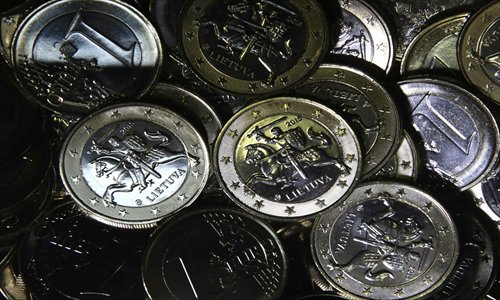HOME >> CHINA
Fake euros popular on Taobao
By Cao Siqi Source:Global Times Published: 2014-12-21 19:38:01

One euro coins in the Lithuanian Mint Photo: CFP
Forget the bureau de change. Xiao Chun (pseudonym) sometimes buys euro coins from taobao.com, China's largest online shopping platform owned by the New York-listed Alibaba Group, before traveling to Europe.
"My friends suggested I buy some coins on Taobao. I bought 100 euro coins at the price of 500 yuan ($80), which is 370 yuan lower than the market price based on the exchange rate then," Xiao Chun told the Global Times.
He said that over 50 percent of the stores in Italy accept the coins and the rest could be used in other places such as subway ticket machines. But the coins' astonishingly low exchange rate may come at the cost of authenticity.
Such a public travel secret has been circulating among travelers and residents in Europe for years. While every year many Taobao shops get shut down, the black market still survives and grows quietly.
Must-buy for trip in Europe
The latest exposure of the "cheaper coins" went viral after a Sina Weibo user posted a screenshot of a Taobao shop's coin sales on December 9, claiming that "it was unbelievable to see some people are spending 500 yuan to buy fake coins, as the yuan-to-euro exchange rate is less than eight!"
According to the current exchange rate, 100 euros are worth around 760 yuan. Some Taobao shops are trying to sell 100 euro coins, possibly fakes, in a bag for 500 yuan, two thirds of the real price. Comments on the shops' webpages noted that the coins could often be used, and customers regretted not buying more.
Soon enough, such online shops were shut down amid growing scrutiny of the business, as Taobao vowed to investigate whether the coins are counterfeit and promised that any illegal products would be removed.
But countless coins have made their way to Europe. On December 12, Italian police seized 556,000 euros ($679,789) in fake coins minted in China from a ship container in the port city of Naples, Reuters reported.
Palermo prosecutor Calogero Ferrara said that this was the largest such seizure in the history of Europe's common currency, which began circulating in 2002.
The 306,000 coins were in one- and two-euro denominations, said Ferrara, adding that the 2-euro coins are "a perfect product" that cannot be distinguished from an authentic coin with the naked eyes, and they can even be used in vending machines.
"My friend bought 100 coins from Taobao before coming to study in Germany. The coins very much resembled the real ones except their colors were brighter," a student studying in Germany surnamed Gao told the Global Times.
Gao added that banks in China do not provide euro coins, but they are very useful in Germany to use in vending machines and supermarket lockers.
'Smart' craftsmanship
As early as 2011, German police launched a raid on a ring of four Chinese gangsters and two flight attendants from the German airline Lufthansa who carried out 6 million euros in fake coins, reported Time Magazine.
The plot of this scam was ingenious, and the fake coins turned out to be old real coins cunningly recrafted. The report revealed that the gang reassembled 29 tons of withdrawn euro coins sold to Chinese posing as scrap-metal dealers who then carried the coins back to Germany to exchange for new ones.
The one-and two-euro coins consist of a nickel-and-copper alloy inner circle surrounded by a brass-and-nickel outer ring and a nickel-and-brass center surrounded by a copper-and-nickel ring, respectively.
When subcontractor firms charged with destroying the coins punched out the core, leaving the coins in two parts, the gangsters put the two parts back together and redeemed the damaged coins for new money at the Bundesbank, the only institution that exchanges new coins free of charge.
The prosecutors said that the Chinese gang mixed counterfeit coins with real ones, making it harder to detect the fakes.
"There are no real 'fake euro coins' in China due to the lack of craftsmanship [to produce counterfeit coins]. Those that look particularly 'fake' are the result of poor craftsmanship in refurbishing," said a Taobao shop owner who sold "refurbished" old coins.
Another way to produce cheaper euros is to clean up coins left in scrapped cars or electric appliances that are transported to China in waste containers, according to another coin dealer reached by the Global Times, who referred to the "reassembled coins" as fake.
"My online shop on Taobao has been closed amid the recent crackdown. There is not much [storage] left," the dealer said.
Risky businesses
Given current manufacturing technology, currency counterfeiting is not as difficult as coin dealers describe. Given the cheap manufacturing cost, it remains to be seen whether the coins in the gray market are real ones being cleaned up or fake ones, Yuan Yinlong, a Henan-based coin collector, told the Global Times.
"Foreign currencies are only allowed to be traded in designated banks or approved foreign currency trade institutions in China. Underground trade involving foreign currencies therefore constitutes crimes of illegal business, and perpetrators could be sentenced to at least five years in jail," said Wu Yongbo, a Guangdong-based lawyer.
"Buying foreign exchange on taobao.com also violates [Chinese] laws, and buyers could face punishment," Wu told the Global Times, adding that splicing and refurbishing coins also constitutes counterfeiting currency.
In another case earlier in May, a local court in Zhejiang Province punished three men for retrieving thousands of coins from products that were transported to China in waste containers and then exchanging them for euros at foreign banks, reported Hangzhou Daily.
The three men were sentenced to up to nine years in jail and fined 6 million, 5 million and 2 million yuan respectively. Their illegal profits were reported to be as much as 130 million yuan in the past six years.
Newspaper headline: Easy money
Newspaper headline: Easy money
Posted in: Society